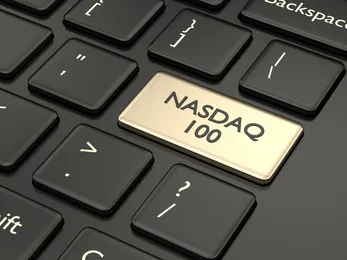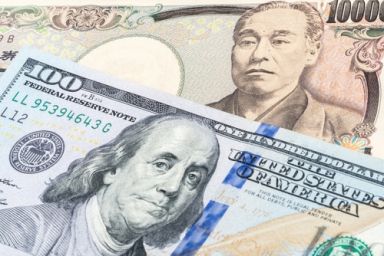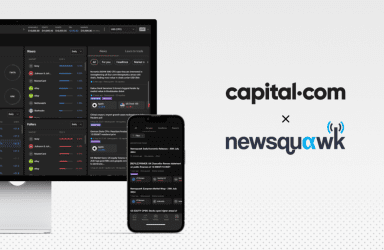Featured articles

DAX 40 continues to push to new highs
The DAX 40 sees six consecutive days of gains as the index pushes to new highs driven by risk-on sentiment
09:54, 12 January 2026

From Caracas to Wall Street: how the U.S.–Venezuela crisis could move markets
The start of the new year has marked a dramatic escalation in the United States’ confrontation with Venezuela.
08:53, 9 January 2026

Intel stock split: what it means for traders
Intel’s long history of stock splits reflects the company’s evolution through several major technology cycles, from early PC growth to data-centric expansion. With its most recent split taking place more than two decades ago, questions often arise about whether Intel may adjust its share structure again.
15:49, 19 December 2025

Sanofi stock forecast: Third-party price targets
Sanofi’s share price reflects the way a large, global pharmaceutical business interacts with markets on a day-to-day basis, responding to company updates, regulatory milestones and wider equity trends.
an hour ago

Goldman Sachs Group stock split: what it means for traders
Goldman Sachs’s share price has evolved over time alongside its strategy, earnings performance and market conditions, yet the company remains one of the few major US financial institutions that has never carried out a stock split.
an hour ago

Orange stock forecast: Third-party price targets
Orange is one of Europe’s largest telecommunications groups, and as of 8 January 2026, the stock trades within a well-defined range and broader European telecoms show relatively steady conditions. Past performance is not a reliable indicator of future results.
2 hours ago

Airbus stock forecast: Third-party price targets
Airbus is one of the world’s largest aerospace manufacturers, with its share price shaped by a mix of commercial aviation cycles, government involvement and long-term industrial strategy. Discover the latest third-party AIR stock forecasts…
21 hours ago

Trading the Nasdaq 100 as Chair Powell is Under Investigation
Risk-off moves in the financial market see futures go for a dip, but it’ll require a bit more to shake off longer-term positive technicals and majority buy sentiment among traders.
10:42, 12 January 2026

DAX 40 continues to push to new highs
The DAX 40 sees six consecutive days of gains as the index pushes to new highs driven by risk-on sentiment
09:54, 12 January 2026

Year-end volatility appears as strong US growth meets Yen intervention risk
US growth comes in stronger than expected in the third quarter and Japan FX intervention rhetoric. ramps up.
10:13, 24 December 2025

Holiday Week Preview: Tech leads, US GDP and Japan CPI in focus
Bullish appetite returns to equity markets as traders focus on the latest US growth data as a final hope for a Santa rally.
11:21, 22 December 2025

Silver price forecast: Third-party outlook
Silver plays a unique role in global markets, sitting at the intersection of industrial demand and speculative interest. Explore third-party XAG/USD forecasts and Capital.com analyst outlook.
14:50, 12 January 2026

Platinum price forecast: Third-party outlook
Platinum has drawn renewed attention at the start of 2026, with prices trading at levels not seen previously and day-to-day ranges widening across recent sessions.
14:35, 12 January 2026

Copper price forecast: Third-party outlook
Copper prices have returned to focus in early 2026 after a period of pronounced volatility, with recent moves placing the metal near levels not seen before on major exchanges.
14:06, 12 January 2026

From Caracas to Wall Street: how the U.S.–Venezuela crisis could move markets
The start of the new year has marked a dramatic escalation in the United States’ confrontation with Venezuela.
08:53, 9 January 2026

From Caracas to Wall Street: how the U.S.–Venezuela crisis could move markets
The start of the new year has marked a dramatic escalation in the United States’ confrontation with Venezuela.
08:53, 9 January 2026

Year-end volatility appears as strong US growth meets Yen intervention risk
US growth comes in stronger than expected in the third quarter and Japan FX intervention rhetoric. ramps up.
10:13, 24 December 2025

Holiday Week Preview: Tech leads, US GDP and Japan CPI in focus
Bullish appetite returns to equity markets as traders focus on the latest US growth data as a final hope for a Santa rally.
11:21, 22 December 2025

USD/JPY forecast 2026–2030: Third-party price targets
USD/JPY is trading around 155.70 in intraday action on 8 December 2025, close to the top of its session range between 154.41 and 155.71 as of 2:44pm UTC. The pair remains near levels seen over the past week, with external data showing fluctuations between roughly 154.5 and 156.0, suggesting relatively contained day-to-day volatility. Past performance is not a reliable indicator of future results.
10:30, 19 December 2025

The Simpsons predicted XRP to hit $589: What’s behind the viral claim?
The link between The Simpsons and real-world events often resurfaces when online communities revisit past episodes for possible references or coincidences. XRP has recently been drawn into this discussion, leading some viewers to question whether the show ever hinted at a specific price level.
17:45, 12 December 2025

Bitcoin price prediction: Third-party outlook
Discover Bitcoin price projections 2025–2030 with third-party BTC forecasts, technical trends, price history, and CFD market sentiment.
16:44, 8 December 2025

Discover Newsquawk: your integrated in-platform newsfeed
News moves fast — and so do the markets. With Newsquawk integrated into Capital.com, you can explore real-time headlines, detailed reports and tailored updates directly where you trade.
08:23, 5 December 2025

Top crypto traders to follow by social media popularity in 2025
Influencers, analysts and developers use digital platforms to exchange ideas, interpret market trends and discuss the development of digital assets. As their audiences grow, these voices increasingly shape how information spreads and how trading discussions evolve across communities.
15:11, 1 December 2025
